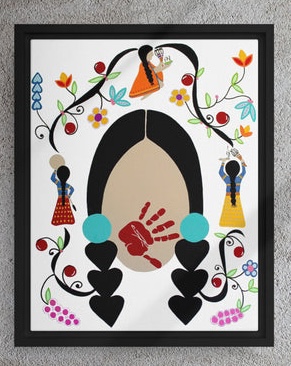Soundscapes of Belonging: Katherine Paul's Return to Sacred Ground
In the liminal space between reverb-drenched chords and ancestral memory lies the music of Black Belt Eagle Scout. Here, Katherine "KP" Paul, of Swinomish, weaves s onic tapestries that blur the boundaries between personal narrative and ancient heritage. Her latest offering, The Land, The Water, The Sky, emerges not merely as a collection of songs but as a cartography of homecoming—each note mapping the sacred geography of return.
onic tapestries that blur the boundaries between personal narrative and ancient heritage. Her latest offering, The Land, The Water, The Sky, emerges not merely as a collection of songs but as a cartography of homecoming—each note mapping the sacred geography of return.
When Paul abandoned the urban confines of Portland, Oregon in 2020 to reclaim her place among the Swinomish people of Skagit County, Washington, she was not simply changing postal codes. She was answering a primordial call, returning to lands where her ancestors had walked "since time immemorial." This migration became the wellspring from which her third album flows—a journey not measured in miles but in revelations.
"This is where I'm meant to be," Paul whispers of that transformative moment when land and identity crystallized into perfect alignment. "I'm meant to be here in this exact moment, in this exact place." The epiphany illuminated a truth she had always carried within: that her psychological wellbeing remained inextricably bound to the soil and waters of her homeland.
The Land, The Water, The Sky unfolds as one continuous meditation across forty-seven minutes—a river of sound that pools and eddies through various emotional landscapes. The album opens with "My Blood Runs Through This Land," where distorted guitar emerges like morning fog over coastal mountains, its jagged edges softened by reverberant mist. Later, "Treeline" pulses with hypnotic rhythm, evoking the quiet psychedelia of twilight hours among ancient cedars, while paradoxically inspiring ecstatic movement during live performances.
In an unprecedented act of vulnerability, Paul invited collaborators into her previously solitary creative sanctuary. Most notable among these is Takiaya Reed of doom metal outfit Divide and Dissolve, who offered both saxophone textures and steadfast encouragement. "When I brought it to Takiaya," Paul recalls, "she would just be like, 'Let's do it, let's try it, let's go for it.'" This artistic partnership allowed ideas to bloom that might otherwise have withered under the weight of self-doubt.
Perhaps most moving is "Spaces," where Paul's mother's voice intertwines with her own in hereditary harmony, while her father's powerful "powwow voice" rises above the composition like an eagle above the landscape—three generations of indigenous voice united in sound.
The album concludes with "Don't Give Up," a gentle benediction that begins in whispered vulnerability—"You wanted a second chance at life / Well, you're alive"—before ascending into a soaring declaration: "I don't give up." The final phrases become a sacred incantation, "The land, the water, the sky," repeated until the words themselves become elemental forces.
Paul's affinity for nature isn't a stylistic choice but an ontological state. "The land, the water, the sky—those are all interconnected. They all are a part of my ancestry, and they're the reason why I'm here today," she explains. This isn't mere artistic posturing but an acknowledgment of cosmic debt.
Yet for all her communal connections, Paul remains fiercely independent. On previous albums, she performed every instrumental part herself—a testament to both her musical versatility and determined self-reliance. Her current willingness to incorporate other musicians represents not a compromise but an evolution.
Her instrumental approach remains refreshingly uncomplicated in philosophy if not in execution. Melodies begin as seedlings in the fertile ground of her white Ernie Ball Music Man St. Vincent Signature guitar, then blossom through a loop station. From these humble beginnings, compositions grow organically, layer by layer, until they form complete ecosystems of sound.
"I always have to have this warm sound with the guitar," she explains. "It has to feel warm to me, and it has to have a little bit of vibrance to it, in terms of texture." This warmth pervades her work through liberal application of Strymon BigSky reverb—an effect so essential it touches nearly every instrument except drums and vocals.
Her guitar influences reveal themselves in moments of quiet confession: the interlocking patterns of the Tren Brothers, whose lines "blend together kind of...like wind chimes"; the dramatic solos of Jimi Hendrix, shared through listening sessions with her father; and the emotional intensity of Nirvana's guitar work.
In an industry where indigenous representation remains vanishingly rare, Paul carries the dual burden of artist and trailblazer. "I want to work really hard so I can carve paths for other people," she reflects, "so they don't have to work as hard as I have in order to fulfill their lives and their art and their music."
Through The Land, The Water, The Sky, Katherine Paul doesn't merely create music—she creates possibility. Each note becomes a stepping stone for future indigenous artists, each song a declaration that native voices belong in the contemporary musical landscape. In returning to her ancestral home, she has created something that extends far beyond herself: a sonic territory where others might one day build their own artistic dwellings.
Homecoming Ceremonies: The Lincoln Theatre Show
On May 9th, 2025, Paul returns to her native soil for a deeply symbolic performance at the historic Lincoln Theatre in Mount Vernon, Washington—mere minutes from the Swinomish reservation where her ancestral roots run deep. This homecoming concert represents more than another tour date; it is a ceremonial gathering, a communion between artist and landscape that echoes the themes of return that permeate her work. The intimate venue, with its century-old architecture and rich acoustics, provides a perfect vessel for Paul's textured compositions and personal narratives of belonging.
This show marks a triumphant moment in a year of both professional ascension and profound personal challenges. Black Belt Eagle Scout's 2025 spring tour spans from the coastal mists of the Pacific Northwest to the urban landscape of Minneapolis, a testament to Paul's growing recognition within the indie music landscape. Yet beneath the surface of this professional momentum lies a more intimate struggle—one that has both tested and revealed the depth of her resilience.
The Medicine Trail: Navigating Multiple Sclerosis with Indigenous Strength
In late summer 2024, Paul faced what she described as a "frightening medical emergency" that led to a diagnosis of relapsing-remitting multiple sclerosis (RRMS). The revelation came after months of unexplained symptoms affecting her mobility and energy—a particularly devastating blow for a musician whose art depends so intrinsically on physical connection with her instruments. Just as her ancestors navigated the challenging waterways of the Puget Sound with unwavering determination, Paul has approached this diagnosis not with despair but with the same fierce spirit that animates her music.
"This has been a difficult time for me as I move into an unknown territory," Paul shared with her community, "especially one where my music is challenging for me to do right now." Yet even in this vulnerability, she finds strength in connection—to her husband Camas Logue, to her family, and to the ancestral wisdom that has guided her throughout her artistic journey. The same themes of resilience that animate "Don't Give Up" now manifest in Paul's own confrontation with chronic illness.
In sharing her diagnosis publicly, Paul continues her work of creating pathways for others—showing that vulnerability and strength are not opposing forces but complementary elements in the indigenous worldview she embodies. Just as she has reclaimed physical territory through her return to Swinomish lands, she now navigates the territory of illness with the same determined spirit, finding medicine in music, community, and the enduring connection to land that has always sustained her.
Her upcoming performance at the Lincoln Theatre thus takes on additional significance—not merely as an artistic expression but as a declaration of presence and persistence in the face of physical challenges. Each note played becomes an act of reclamation, each song a testament to the indigenous resilience that flows through her veins as surely as the waters of the Skagit River flow through her ancestral homeland.
Through both artistic triumph and personal trial, Katherine Paul continues to embody the message that pulses through her music: that in returning to our roots—whether physical, cultural, or spiritual—we find not just comfort but the strength to face whatever currents may come. In the sacred geography of The Land, The Water, The Sky, the most powerful landmarks are not mountains or rivers, but the indomitable human spirit that, like Paul herself, refuses to be diminished by either historical erasure or personal adversity.
Source: Premier Guitar
